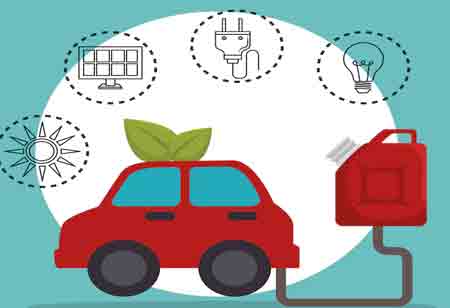Thank you for Subscribing to Energy Business Review Weekly Brief
Utilizing Alternative Fuel Choices for a More Sustainable Shipping
Due to environmental concerns and strict laws, cleaner and greener shipping is required, and this groundbreaking series offers insightful information about the difficulties, advantages, and realities of using alternative fuels.

By
Energy Business Review | Thursday, February 27, 2025
Stay ahead of the industry with exclusive feature stories on the top companies, expert insights and the latest news delivered straight to your inbox. Subscribe today.
Due to environmental concerns and strict laws, cleaner and greener shipping is required, and this groundbreaking series offers insightful information about the difficulties, advantages, and realities of using alternative fuels.
Fremont, CA: Stricter environmental rules have led to a growing number of ships using alternative fuels, which has a variety of ramifications for cost management and logistical operations in the marine industry. Due to the growing problem of climate change, this industry is in greater need of sustainable and renewable marine fuels.
This article examines the most recent advancements in this field and how they might change the shipping sector in the years to come.
Ammonia
Numerous maritime engines, including dual-fuel engines that can alternate between ammonia and traditional fuels, can use ammonia. Due to its high energy density and low viscosity, it is a good choice for long-distance shipping operations.
However, issues with bunkering and storage facilities prevent ammonia from being widely used as a naval fuel. The shipping industry currently needs more specialized facilities and equipment to safely and effectively handle ammonia.
Biofuel
In the maritime sector, biofuel is showing promise as a substitute for conventional fossil fuels, possibly lowering greenhouse gas emissions and moving closer to a more sustainable future.
The maritime industry is investigating numerous biofuels, such as glycerol, hydrotreated vegetable oils (HVO), biomass-to-liquid (BTL) products, fatty acid methyl esters (FAME), and straight vegetable oil (SVO) products.
LNG
Since LNG (liquefied natural gas) has the potential to drastically cut emissions, it is becoming a more environmentally acceptable alternative to conventional marine fuels for transportation. The maritime sector is investigating LNG as part of its plan to transition to more sustainable and environmentally friendly operations. The industry's dedication to environmental goals and the requirement to adhere to international rules to lower greenhouse gas emissions from ships are the driving forces behind this change.
LPG
Liquefied petroleum gas, or LPG, is a cleaner, more environmentally friendly alternative fuel showing promise for the maritime sector. Because LPG emits fewer greenhouse gases and almost no sulfur, it is a standout option for the transportation industry looking to lessen its environmental impact.
Ships increasingly use LPG as fuel due to the International Maritime Organization's (IMO) strict sulfur content requirements. Because of its capacity to adhere to regional and international sulfur regulations and its potential to lower nitrogen oxide (NOx) emissions, LPG is a desirable option for the sector. LPG's feasibility as a marine fuel is further supported by the infrastructure that is now in place throughout the world, including facilities for loading and storing it.
Methanol
Methanol is a versatile and easily accessible chemical that may be made from several renewable resources. As the shipping industry continues its decarbonization path, it is being examined as one of the possible replacement fuels.
The world is always looking for fresh and creative methods to transition away from fossil fuels and toward clean energy sources. In recent years, methanol has become a more popular choice.
Nuclear
Nuclear has the potential to revolutionize the offshore and shipping sectors. Although not a novel idea, nuclear-powered ships have the potential to significantly lower greenhouse gas emissions compared to conventional fuels.
Nuclear power's unique energy density, millions of times higher than that of conventional fuels, and its capacity to function make it unique. With a safety track record in naval applications, this technology is now set to revolutionize commercial transportation, especially for deep-sea trips.






